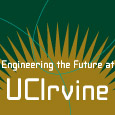| |
|
|
Thrust Areas

|
Thermochemical Engines Thrust #1 |
|
| To improve the efficiency of small thermochemical engines, projects examine and reduce heat losses, collect and use waste heat, and improve liquid fueled combustion performance in small volumes via modeling and diagnostics. Precision manufacturing is employed to build the small combustors and support systems.
[Thrust 1 Participants] |

| Challenge |
Develop and demonstrate miniature engines with 20% shaft
work/chemical energy efficiency and 1000 W output power in less than
0.75 liter volume and 0.5 kg mass (without fuel) |
| Principal Barriers |
| Fuel and oxidizer delivery mechanisms
Ignition and combustion efficiency in small volumes
Friction and leaks
Thermal management and waste heat utilization
Emission reduction (noise and combustion products) |
| Research Team |
| A.C. Fernandez-Pello, UCB, ME, combustion and mini-rotary engine
D. Walther, UCB, ME, MEMS engines
A. Majumdar, UCB, ME nanowire thermoelectricity
A. Lavine, UCLA, MAE, shape memory allows, heat transfer
P. Ronney, USC, microcombustion, thermal modeling
W.A. Sirignano, UCI, MAE, film combustion, computational combustion
F. Liu, UCI, MAE, turbomachinery, numerical simulation
Research Contributors from other Thrust Areas
D. Dunn-Rankin, UCI, MAE, combustion, laser diagnostics
R. Penner, UCI, Chemistry, electrochemistry and nanowires
G. Carman, UCLA, MAE, shape memory allows |

|
Electrochemical Energy Thrust #2 |
|
| In order to enhance the effective energy and power density of electrochemical cells, projects examine microstructured electrodes and electrolytes that can reduce weight or produce flexibility in power extraction. In addition, projects explore direct fuel cell operation on alternative high energy-density condensed fuels.
[Thrust 2 Participants] |

| Challenge |
| create intelligent high power density electrochemical
cells, 300 We/kg average, 10:1 power turndown ratio and less than
10% energy storage performance reduction |
| Principal Barriers |
High surface area required
Unstable performance at peak power
Fuel limitations: hydrogen fuel storage insufficiently compact; common alternatives require reforming or dilute fuel mixtures
Mass of membrane electrode assemblies
Poor dynamic power response due to transport limitations |
| Research Team |
M. Madou, UCI, to be MAE, electrochemistry and MEMS
R. Penner, UCI, Chemistry, electrochemistry and nanowires
J.C. LaRue -- UCI, MAE, ammonia fuel cell
C. Mehring -- UCI, MAE, fluid dynamics modeling, motion sensors
K. Shea – UCI, Chemistry, fuel cell membranes
W. Evans, UCI, Chemistry, high purity materials
Research Contributors from other Thrust Areas
F. Jabbari, UCI, MAE, fuel cell control
F. Prinz, Stanford, ME/Materials, manufacturing and fuel cells
G.S. Samuelsen, UCI, MAE, National Fuel Cell Research Center |

|
Biochemical Power Thrust #3 |
|
| To design natural power generators, biochemical studies aim toward inhancing and harnessing natural metabolic power production occurring in cells and then toward mechanisms for extracting the power in a useable form. In addition, micropump development is needed for delivering nutrients to cells or cell-based systems.
[Thrust 3 Participants] |

| Challenge |
| demonstrate controllable biologically inspired or
derived electro/mechanical power at 30 W, 25% overall efficiency,
and 200 W/kg. |
| Principal Barriers |
Fuel and oxidizer delivery mechanisms
Metabolic function control
Fabrication or replication of artificial or natural biopower cells
Biopower transduction |
| Research Team |
J. Hicks, Leader, UCI, Evolutionary Biology, cardiopulmonary
physiology
Lee, UCI, Biomedical Engineering, fluidics and bioMEMS
M. Mulligan, UCI, Biological Sciences, microbiology
M. Cumsky, UCI, Biological Sciences, mitochondria
V. Caiozzo, UCI, Biological Sciences, muscle metabolism
W. Tang, UCI, Biomedical Engineering, bioMEMS
J. Earthman, UCI, CEMS, corrosion, biomaterials, failure |

|
Precision Manufacturing Thrust #4 |
|
This enabling technology group develops and implements fabrication
methods to create the power components and elements needed in the power technology thrust areas. Precision manufacturing also participates in hybrid system construction. Manufacturing methods for personal power components range from the nanoscale to the mesoscale.
[Thrust 4 Participants]
|

| Challenge |
| utilize state-of-the-art manufacturing methods to create
personal power components and devices of the required precision at
the required scale |
| Principal Barriers |
Relative precision decreases with decreasing device size
Integrating manufacturing at the nano-, micro-, and mesoscale
Design for manufacturing in personal power devices |
| Research Team |
F. Prinz, Stanford, ME/Materials, manufacturing and fuel cells
M. Orme, UCI, MAE, precision drop-based manufacturing
E.J. Lavernia, UCD, CEMS, spray deposition ceramics
G. Carman, UCLA, MAE, shape memory alloys
A. Shkel, UCI, MAE, MEMS, systems engineering
M. Mecartney, UCI, CEMS, fuel cell membrane fabrication
R. Nelson, UCI, ECE, MEMS fabrication |

|
Systems Control and Integration Thrust #5 |
|
The creation of effective power modules relies on control and
integration to link the power needed by an application to the power module providing it. The integration team develops the tools for power matching, thereby creating optimal hybrid powersystems for demanding applications. In addition, model-based predictions guide thrust efforts by
identifying component technology improvements that have system-level performance payoffs. [Thrust 5 Participants] |

| Challenge |
| Develop personal power systems that are optimized to meet the specific power profile demanded
for specific autonomous functions |
| Principal Barriers |
Customized power extraction methods
Integrating and optimizing power sources
Sensing and control of personal power systems |
| Research Team |
J.E. Bobrow, UCI, MAE, controls and robotics
H. Kazerooni, UCB, robotic systems
G.S. Samuelsen, UCI, MAE, fuel cells, energy systems
J. Hemminger, UCI, Chemistry, surface chemistry
D. Reinkensmeyer, UCI, MAE, rehabilitation robotics
K. Smedley, UCI, ECE, power electronics
S. Sanders, UCB, EE, microgenerators
Research Contributors from other Thrust Areas
K. Mease, UCI, MAE, controls and systems
F. Jabbari, UCI, MAE, control theory |
|
|

